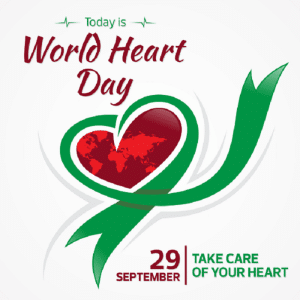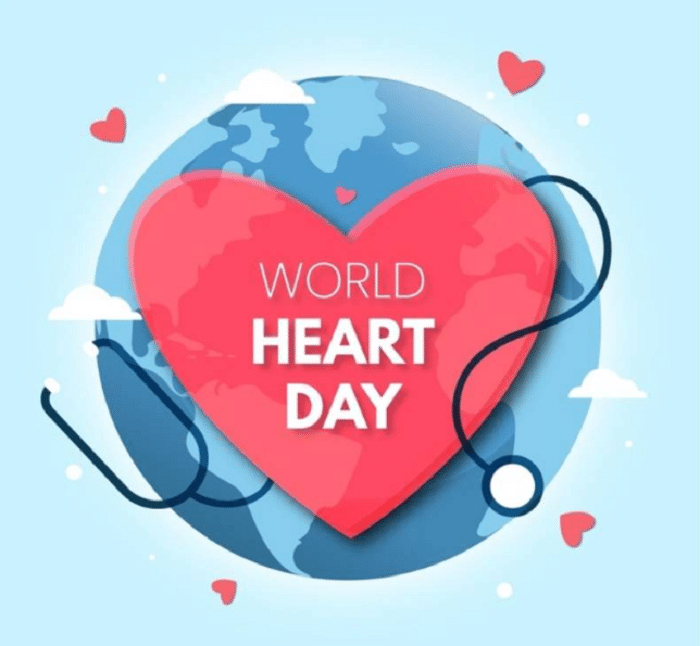World Heart Day 2023: In the grand narrative of life, our hearts are the unsung heroes, tirelessly orchestrating the symphony of our existence. Imagine a day dedicated to honoring this rhythmic powerhouse—World Heart Day! Celebrated worldwide on September 29th, it’s not just a date; it’s a heartbeat echoing globally, urging everyone to join in the celebration of heart health. This year’s theme, “Use Heart, Know Heart” is an invitation to everyone, everywhere, to discover the simple yet mighty steps towards a healthier heart. As we embark on this journey of understanding, let’s unravel the secrets of a heart-healthy life, ensuring our hearts beat stronger, longer, and united in the vibrant chorus of well-being.
Introduction To World Heart Day 2023:
World Heart Day is an annual event observed on September 29th to raise awareness about cardiovascular diseases (CVDs) and promote heart health worldwide. According to the World Health Organization (WHO), CVDs are the leading cause of death globally, accounting for 32% of all deaths in 2019. The World Heart Federation (WHF) estimates that non-communicable diseases (NCDs), including CVDs, contribute to 60% of total adult deaths in India alone. It is crucial to shift our focus from mere protection to prevention in order to combat this alarming trend.
Overview Of Cardiovascular Diseases – World Heart Day 2023:
Cardiovascular diseases (CVDs) encompass a range of disorders that affect the heart and blood vessels. The most common types of CVDs include coronary artery disease (CAD), heart failure, arrhythmias, heart valve disease, cardiomyopathy, congenital heart disease, and pericardial disease. These conditions can lead to serious health complications, such as heart attacks, strokes, and heart failure, if left untreated or unmanaged.
History And Significance Of World Heart Day:
World Heart Day was established in 2000 through a collaboration between the World Heart Federation and the World Health Organization. The aim of this global initiative is to raise awareness about CVDs, promote heart-healthy lifestyles, and encourage individuals to take proactive steps toward preventing heart diseases. Since its inception, World Heart Day has become a significant event observed by healthcare organizations, schools, communities, and individuals across the globe.
Theme For World Heart Day 2023:
The theme for World Heart Day 2023 is “Use Heart, Know Heart.” This theme emphasizes the importance of understanding and taking care of our hearts. It encourages individuals to prioritize heart health by adopting healthy lifestyles, making informed choices, and seeking timely medical attention. The theme highlights the role of every individual in safeguarding their heart health and contributing to the prevention of cardiovascular diseases.
Quotes And Messages For World Heart Day:
- “Take a step towards a healthier heart. Use your heart wisely, know its needs.”
- “Your heart is your lifeline. Nurture it with love, care, and healthy choices.”
- “Prevention is the key to a healthier heart. Start today, make heart-healthy choices.”
- “On World Heart Day, let’s unite to protect and prevent. Together, we can make a difference.”
- “Your heart is precious. Take charge of your heart health and make it a priority.”
Top Cardiac Disorders To Be Aware Of:
- Coronary Artery Disease (CAD): This common heart disease occurs when the coronary arteries, which supply blood to the heart, become blocked or narrowed due to the buildup of plaque. CAD can lead to chest pain (angina) or a heart attack.
- Heart Arrhythmias: Irregular heart rhythms, known as arrhythmias, can cause the heart to beat too fast, too slow, or irregularly. This can disrupt the normal functioning of the heart and may require medical intervention.
- Heart Failure: Heart failure occurs when the heart is unable to pump enough blood to meet the body’s needs. It can be caused by various factors, including coronary artery disease, high blood pressure, and certain medical conditions.
- Heart Valve Disease: This condition occurs when the valves in the heart do not function properly, leading to either a narrowing or leakage of blood flow. It can be caused by congenital heart defects, infections, or age-related degeneration.
- Pericardial Disease: Pericardial diseases involve inflammation or infection of the pericardium, the sac surrounding the heart. Pericarditis, an inflammation of the pericardium, can cause chest pain and other symptoms.
- Cardiomyopathy: Cardiomyopathy refers to diseases of the heart muscle, resulting in the heart becoming enlarged, thickened, or rigid. It can affect the heart’s ability to pump blood effectively.
- Congenital Heart Disease: Congenital heart disease refers to structural abnormalities present in the heart at birth. It can range from mild to severe and may require medical intervention or surgery.
Risk Factors For Cardiovascular Diseases:
Several risk factors contribute to the development of cardiovascular diseases. These include:
- Age: The risk of heart disease increases with age.
- Physical inactivity: Lack of regular physical activity can contribute to the development of heart disease.
- Diabetes or metabolic syndrome: Individuals with diabetes or metabolic syndrome have a higher risk of developing heart disease.
- Family history: Having a family history of heart disease increases the likelihood of developing the condition.
- Genetics: Certain genetic factors can predispose individuals to heart disease.
- High blood pressure: Uncontrolled high blood pressure is a significant risk factor for heart disease.
- High cholesterol levels: Elevated levels of LDL (bad) cholesterol or low levels of HDL (good) cholesterol increase the risk of heart disease.
- Obesity: Being a higher-weight person puts additional strain on the heart and increases the risk of heart disease.
- Smoking: Smoking damages blood vessels and increases the risk of heart disease.
- Stress: Chronic stress can contribute to the development of heart disease.
Early Signs Of Cardiovascular Diseases:
Recognizing and acting upon early signs of cardiovascular diseases can help prevent complications. Some common early signs include:
- Chest pain or discomfort: This can be a sign of angina or a heart attack.
- Shortness of breath: Difficulty breathing or feeling breathless during physical activity or at rest.
- Coughing or wheezing: Persistent cough or wheezing that may indicate heart failure.
- Swelling in the legs, ankles, or feet: Fluid retention can cause swelling in the lower extremities.
- Fatigue: Feeling excessively tired or lacking energy, even with minimal exertion.
- Palpitations: Sensations of a rapid or irregular heartbeat.
Additional Information – World Heart Day 2023:
- Regular exercise, a balanced diet, and stress management techniques can help prevent heart disease.
- Regular check-ups and screenings can help identify risk factors and detect early signs of heart disease.
- Medications, lifestyle changes, and medical procedures may be recommended for the management and treatment of heart disease.
- It is important to educate oneself about heart health and promote awareness within communities.
Frequently Asked Questions (FAQs) – World Heart Day 2023:
When is World Heart Day celebrated in 2023?
World Heart Day is celebrated annually on September 29th. In 2023, like every year, this significant global observance falls on the same date. It serves as a timely reminder for individuals and communities worldwide to come together in raising awareness about cardiovascular health, promoting heart-healthy lifestyles, and collectively addressing the challenges posed by cardiovascular diseases. So, mark your calendars and join the global initiative to empower hearts and prioritize cardiovascular well-being on September 29th, 2023!
How can I prevent cardiovascular diseases?
To prevent cardiovascular diseases, adopt a heart-healthy lifestyle by exercising regularly, maintaining a balanced diet, managing stress, avoiding tobacco use, and getting regular check-ups.
Is heart disease hereditary?
While genetics can play a role in heart disease, lifestyle factors also significantly impact its development. Having a family history of heart disease does not guarantee that an individual will develop the condition, but it may increase their risk.
Can cardiovascular diseases be reversed?
While some damage caused by heart disease may be irreversible, adopting a healthy lifestyle and following medical advice can help manage the condition and prevent further complications.
How often should I get my heart checked?
It is recommended to have regular check-ups with a healthcare professional who can assess your heart health and provide guidance based on your individual risk factors.
Can stress contribute to heart disease?
Chronic stress can contribute to the development of heart disease. Implementing stress management techniques, such as exercise, meditation, and relaxation techniques, can help reduce the impact of stress on heart health.
Conclusion – World Heart Day:
World Heart Day serves as a reminder to prioritize heart health and shift our perspective from protection to prevention. By adopting a heart-healthy lifestyle, managing risk factors, and seeking timely medical attention, we can reduce the burden of cardiovascular diseases. Let us use our hearts wisely, know their needs, and take proactive steps toward a healthier future. Remember, prevention is key in safeguarding our most vital organ, the heart.

